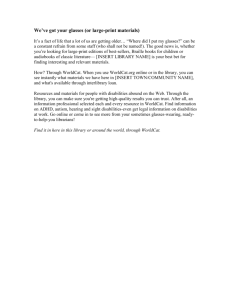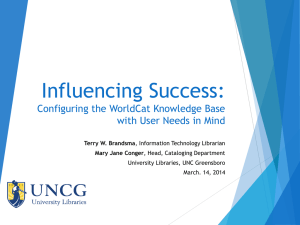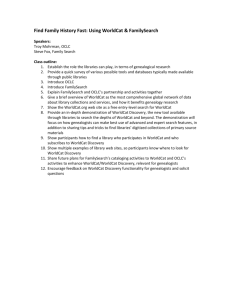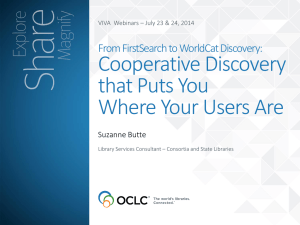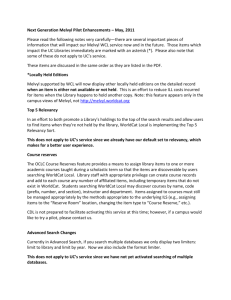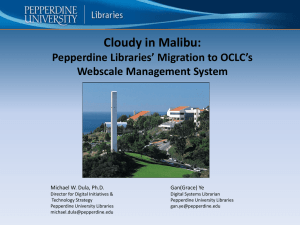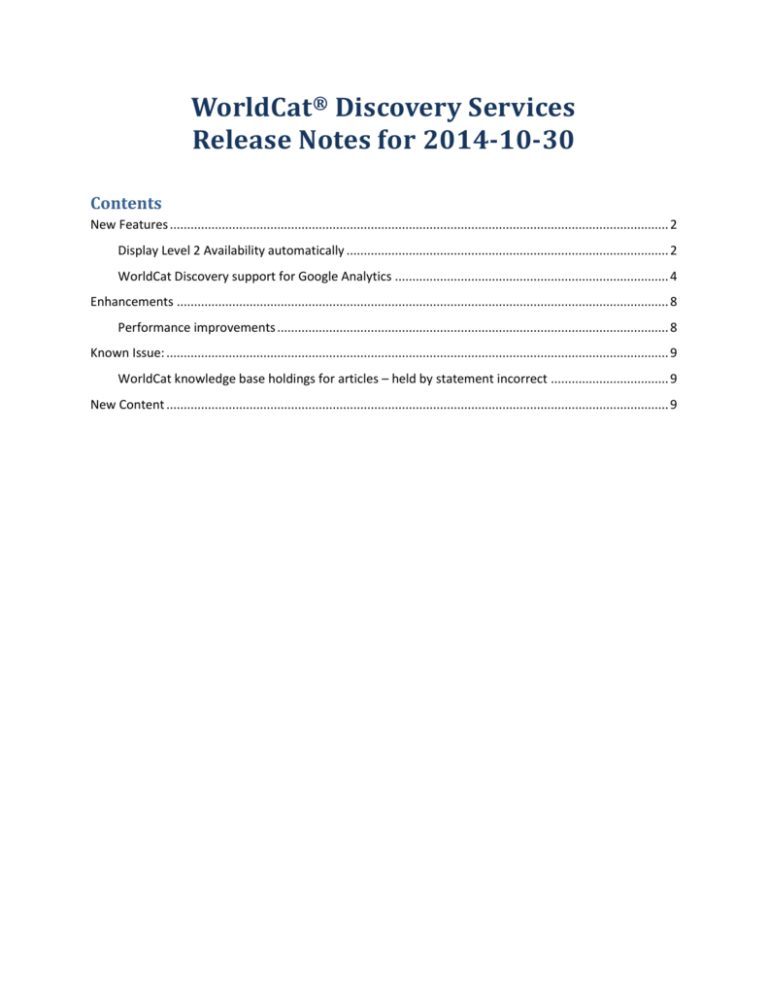
WorldCat® Discovery Services
Release Notes for 2014-10-30
Contents
New Features ................................................................................................................................................ 2
Display Level 2 Availability automatically ............................................................................................. 2
WorldCat Discovery support for Google Analytics ............................................................................... 4
Enhancements .............................................................................................................................................. 8
Performance improvements ................................................................................................................. 8
Known Issue: ................................................................................................................................................. 9
WorldCat knowledge base holdings for articles – held by statement incorrect .................................. 9
New Content ................................................................................................................................................. 9
New Features
Display Level 2 Availability automatically
This new feature is available only to WorldCat Discovery institutions that have purchased the Availability
and Group Views options. Existing WorldCat Local and WorldShare Management Services (WMS)
libraries already have the capability to configure a Level 2 availability display.
Based on feedback from our subscribers we have added a new OCLC Service Configuration Setting in
WorldCat Discovery only (i.e. not available in WorldCat Local), to automatically check and display
availability for Level 2.
This new setting is located under My WorldCat.org >> OPAC Statuses, Locations and Circulation
Policies, about ½ way down (before the grid). See below.
Current production:
Here is an image of how Level 2 looks today in production. Check Availability buttons display and can be
clicked individually to send out the call and bring back the availability for Level 2. Many institutions have
numerous buttons if their institutions get availability from various OPAC systems (i.e. virtual groups).
Others may only have one button configured at Level 2, but it would still need to be clicked.
2
Post-install:
Shown below is what the display will look like after configuring the new Service Configuration setting to
Automatically check and display availability for Level 2. Each Check Availability button is opened
automatically and the availability information is displayed for each institution which holds the item and
is part of Level 2.
This new configuration applies to only Level 2 (not Level 3).
Keep in mind depending on your Level 2 configuration this feature can display much more availability
information, just as if the user had checked all the Check Availability buttons separately. If you have
several institutions profiled in your Level 2 enabling this feature will also mean there could be a lot more
to scroll through.
3
WorldCat Discovery support for Google Analytics
WorldCat Discovery is now enabled to pass data to Google Analytics. This new feature is available to all
WorldCat Discovery libraries.
As a reminder, last month we implemented a new module in OCLC Service Configuration >> My
Worldcat.org >> Google Analytics. This is where you will add your Google Analytics Tracker ID for
WorldCat Discovery.
You must go to http://www.google.com/analytics/ and set up a Universal Analytics Account to obtain
your Google Analytics Tracker ID. We recommend creating a Google Analytics account for WorldCat
Discovery even if you have an existing one.
If you are currently using Google Classic Analytics, you will need a new Universal Analytics account for
WorldCat Discovery integration.
4
5
Here is some sample data to provide an idea of what WorldCat Discovery passes to Google Analytics.
WorldCat Discovery:
6
OCLC link resolver:
7
For WMS libraries, patron account:
Enhancements
Performance improvements
During the month of October we significantly improved response time issues. We will continue to
monitor performance and address any issues we find, whether reported by our members or based on
our own analysis. The fixes we made have already been installed to production as we deemed them too
important to wait for the monthly release.
8
Known Issue:
WorldCat knowledge base holdings for articles – held by statement
incorrect
In our August release, we announced the feature that allows Discovery libraries to determine what full
text links are displayed to your users using the collections you’ve configured in the WorldCat knowledge
base.
We are actively working on an issue in this feature, the issue is the Held by statement is not being
correctly updated which means your users may be presented the results that do not have a full text link
from the knowledge base.
We will implement this fix as soon as possible.
New Content
This is a list of new databases added to the central index since our last update.
As a reminder, the central index provides content for WorldCat Discovery.
You can enable these databases as search options in the Licensed Content and Databases module of the
OCLC Service Configuration site. Please remember that your library must have a valid subscription to
these databases in order to enable them.
You will find a list of everything included in the central index for WorldCat Discovery at
http://oclc.org/worldcat-discovery/resources.en.html
Individual collections from Accessible Archives. Please note that these databases will replace the
current Accessible Archives database (target ID 1940) in early 2015.
African American Newspapers from Accessible Archives Inc:
This enormous collection of African American newspapers contains a wealth of
information about cultural life and history during the 1800s and is rich with first-hand
reports of the major events and issues of the day, including the Mexican War,
Presidential and Congressional addresses, Congressional abstracts, business and
commodity markets, the humanities, world travel and religion. The collection also
provides a great number of early biographies, vital statistics, essays and editorials,
9
poetry and prose, and advertisements all of which embody the African-American
experience.
National Anti-Slavery Standard from Accessible Archives Inc:
National Anti-Slavery Standard was the official weekly newspaper of the American AntiSlavery Society, an abolitionist society founded in 1833 by William Lloyd Garrison and
Arthur Tappan to spread their movement across the nation with printed materials.
Frederick Douglass was a key leader of this society and often addressed meetings at its
New York City headquarters.
National Citizen and Ballot Box from Accessible Archives Inc:
The National Citizen and Ballot Box was a monthly journal deeply involved in the roots
of the American feminist movement. It was owned and edited by Matilda Joslyn Gage,
American women’s rights advocate, who helped to lead and publicize the suffrage
movement in the United States. Gage included her intentions for the paper in a
prospectus: “Its especial object will be to secure national protection to women citizens
in the exercise of their rights to vote…it will oppose Class Legislation of whatever
form…Women of every class, condition, rank and name will find this paper their friend.”
South Carolina Newspapers from Accessible Archives Inc:
This collection contains a wealth of information on colonial and early American History
and genealogy, and provides an accurate glimpse of life in South Carolina and America,
with additional coverage of events in Europe, during the early days of this country.
The Liberator from Accessible Archives Inc:
The Liberator was a weekly newspaper published by William Lloyd Garrison in Boston,
Massachusetts. Garrison was a journalistic crusader who advocated the immediate
emancipation of all slaves and gained a national reputation for being one of the most
radical of American abolitionists.
The Lily from Accessible Archives Inc:
The Lily, the first newspaper for women, was issued from 1849 until 1853 under the
editorship of Amelia Bloomer (1818-1894). The newspaper began as a temperance
journal. Bloomer felt that as women lecturers were considered unseemly, writing was
the best way for women to work for reform.
The Pennsylvania Gazette from Accessible Archives Inc:
10
The Pennsylvania Gazette was one of the United States’ most prominent newspapers
from 1728—before the time period of the American Revolution—until 1800. Published
in Philadelphia from 1728 through 1800, it provides the reader with a first-hand view of
colonial America, the American Revolution and the New Republic, and offers important
social, political and cultural perspectives of each of the periods.
The Pennsylvania Genealogical Catalog from Accessible Archives Inc:
This database primarily is a listing of marriages, deaths and obituaries from The Village
Record, published in West Chester, Pennsylvania. Subscribers will also find information
about emigration patterns, customs and traditions, important events, medical history,
biographical data, and more within this collection.
The Pennsylvania Newspaper Record from Accessible Archives Inc:
This database documents the move to industrialization from a predominantly agrarian
culture established by Quaker farmers in the 18th century. The collection contains fulltext transcriptions of articles, advertisements and vital statistics, providing insight into
technology, business activity and material culture in a down-river milling and
manufacturing community at the height of the Industrial Revolution.
The Revolution, 1868-1872 from Accessible Archives Inc:
The Revolution, a weekly women’s rights newspaper, was the official publication of the
National Woman Suffrage Association formed by feminists Elizabeth Cady Stanton and
Susan B. Anthony to secure women’s enfranchisement through a federal constitutional
amendment. It was published between January 8, 1868 and February, 1872.
The Virginia Gazette from Accessible Archives Inc:
The Virginia Gazette was the first newspaper published in Virginia and the first to be
published in the area south of the Potomac River in the colonial period of the United
States. Issues have the following subtitle: “Containing the freshest advices, foreign and
domestick”. Published weekly in Williamsburg, Virginia between 1736 and 1780, it
contained news covering all of Virginia and also included information from other
colonies, Scotland, England and additional countries.
Early American Imprints, Series I: Evans, 1639 – 1800 from Readex, a division of NewsBank,
Inc.:
Early American Imprints, Series I: Evans, 1639-1800 has been hailed as the definitive
resource for researching every aspect of 17th- and 18th-century America.
11
Early American Imprints, Series II: Shaw – Shoemaker, 1801 – 1819 from Readex, a division of
NewsBank, Inc.:
Early American Imprints, Series II: Shaw-Shoemaker, 1801-1819 provides a
comprehensive set of American books, pamphlets and broadsides published in the early
part of the 19th century.
American Broadsides and Ephemera, Series I, 1760 – 1900 from Readex, a division of
NewsBank, Inc.:
American Broadsides and Ephemera, Series I, 1760-1900 offers full-color digital facsimile
images of broadsides printed between 1820 and 1900 and ephemera printed between
1749 and 1900.
©2014 OCLC Online Computer Library Center, Inc. All rights reserved. The following OCLC product and service names are trademarks or service
marks of OCLC Online Computer Library Center, Inc.: FirstSearch, OCLC, WorldCat, WorldCat knowledge base, WorldCat Local, WorldCat
Discovery Services, WorldCat Discovery, WorldShare, WorldShare Interlibrary Loan, WorldShare License Manager, WorldShare Management
Services, WorldShare Metadata, WorldShare Metadata API, WorldShare Metadata Collection Manager, WorldShare Metadata Record Manager,
WorldShare Platform and “The world’s libraries. Connected.” The OCLC, WorldCat and WorldShare symbols are service marks of OCLC. Thirdparty product service names are trademarks or service marks of their respective companies. OCLC grants permission to photocopy this
publication as needed.
12

